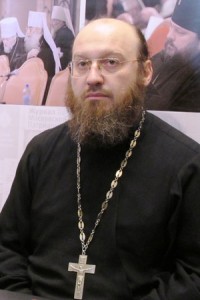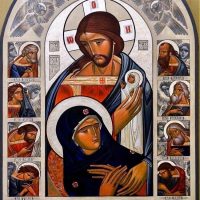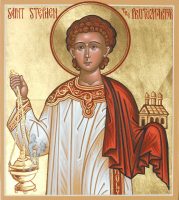On May 5/18, the Russian Orthodox Church honors the icon of the Mother of God known as the “Inexhaustible Cup.” The special veneration of this icon goes back to the late nineteenth century, when a peasant suffering from alcoholism dreamed repeatedly of a venerable old man instructing him to go to the Convent of the Entrance of the Theotokos in Serpukhov (about sixty miles south of Moscow), where he should request a moleben (supplicatory service) to be served before an icon called the Inexhaustible Cup. Having reached the convent, he was told that no such icon was known; however, following a search, they discovered the icon hidden in a passageway. The moleben was served, and the peasant fully recovered. Word spread, and this icon came to be venerated throughout all of Russia as a source of healing from alcoholism. The original icon was lost during the turmoil of the early twentieth century.
In 1991, the Vysotsky Monastery in Serpukhov, founded in 1374 by St. Sergius of Radonezh, was reopened under the direction of Archimandrite Joseph (Balabanov, now Bishop of Birobidzhan and Kuldursk). In 1992, the iconographer Alexander Sokolov painted a new copy of the icon, corresponding in all details to the original. In 1993 it was installed in the Vysotsky Monastery, where it is now venerated as wonderworking, particularly in healing from addiction. In 1996, another copy was installed at the above-mentioned convent (popularly known as the Vladychny Convent). The wonderworking icon located in the Vysotsky Monastery has become renowned throughout all of Russia (and, indeed, throughout the entire Orthodox world). In 1997, in recognition of its veneration, its commemoration was entered into the official liturgical calendar of the Russian Orthodox Church with the blessing of His Holiness, the late Patriarch Alexy II. People suffering from alcoholism, drug addiction, and other dependencies continue to appeal to God for help and healing through this icon.
In order to mark this commemoration, we offer four reflections on the problem of alcoholism and drug addiction, with special reference to the question of the compatibility of 12-step programs with Orthodox Christianity, by several preeminent representatives of the Russian Orthodox Church. First is an except from an interview given by His Holiness, the late Patriarch Alexy II of Moscow and All Russia (+2008); then statements by His Holiness, Patriarch Kirill of Moscow and All Russia, and His Eminence, Metropolitan Hilarion (Alfeyev) of Volokolamsk; and, finally, a brief interview with Igumen Jonah (Zaimovsky), director of the “Metanoia” rehabilitation center at Danilov Monastery in Moscow.
Excerpt from an interview given by His Holiness, the late Patriarch Alexy II:
 In addition to the pharmacological methods used for the treatment of drug addiction and alcoholism, there are also the so-called spiritually oriented programs. One of the most famous is the 12-step program used by the internationally known fellowships of Alcoholics Anonymous (AA) and Narcotics Anonymous (NA). There are AA and NA self-help groups in practically every country of the world. How applicable are such endeavors in Russia?
In addition to the pharmacological methods used for the treatment of drug addiction and alcoholism, there are also the so-called spiritually oriented programs. One of the most famous is the 12-step program used by the internationally known fellowships of Alcoholics Anonymous (AA) and Narcotics Anonymous (NA). There are AA and NA self-help groups in practically every country of the world. How applicable are such endeavors in Russia?
One should not straightaway reject and criticize ideas that serve for people’s good just because they (the ideas) were born outside of Orthodoxy. The experience amassed within the fellowships of Alcoholics Anonymous and Narcotics Anonymous should not be ignored in Russia; on the contrary, it should be the subject of intensive study. However, it should be born in mind that methods that work effectively abroad can sometimes be inapplicable here. I think that, in the conditions of Russia and other Orthodox countries, where tens of millions of people associate their spiritual health with their paternal faith, one needs to try to infuse these programs with our religious and moral components, combining their medical and psychological achievements with our Orthodox spiritual foundation.
The opinions of priests within the Russian Orthodox Church with regard to the problem of alcoholism and drug addiction often vary. Some think that purely spiritual methods should be employed to combat them: molebens [supplicatory services], akathists, stays in monasteries, fasts, vows of abstinence, pilgrimages, etc. At the same time, other priests welcome and support the practices of AA and NA. Why do you think that the opinions of priests vary?
The cause of such a difference of opinion is the complexity of the problem of alcoholism and drug addiction. As has already been noted many times, it is precisely the collective efforts of physicians, psychologists, and priests that can best contribute to deliverance from alcohol and drug addiction.
Bear in mind that someone in recovery is in dire need of having the realm of soul and spirit, which had been filled by drugs and alcohol, refilled. If the Church does not cooperate with the fellowships of Alcoholics Anonymous and Narcotics Anonymous – as with many other similar organizations operating successfully throughout the world – then sects will take them up.
Some priests are troubled by the fact that at AA meetings the participants hold hands during the closing prayer. But the biggest stumbling block is the expression “Higher Power” or “God as we understand Him” – although the program also speaks of the loving God. But the term “Higher Power” is offered to alcoholics and drug addicts who are not believers, of which there are very many in Russia. What is your opinion in this regard?
This might be acceptable for non-believers, but if Orthodox people get together, especially those performing ecclesiastical penance, then the controversial formulation “a Higher Power of our own understanding” should be corrected, because the Church does not accept this sort of dogmatic indifference.
At the same time, the traditions of external order that have emerged within such fellowships are not matters of primary importance. If there are people who are in need of healing from their terrible wounds, and who turn their souls to God, then it is unwise to close the doors of the Church to them simply because they hold hands in prayer. However, this does not mean that, in the practical activity of rehabilitating alcoholics and drug addicts, one can simplify one or another condition of the Christian faith. Such activity should be inseparably linked with catechetical functions and the involvement in full-fledged church life of those struggling for deliverance from alcohol and drugs.
Statement by His Holiness, Patriarch Kirill:
I am deeply convinced that we should welcome whatever means can help deliver someone from alcoholism and drug addiction, so long as these means are not joined with the rejection of Christian faith and Christian convictions. Only those are unwelcome that inflict harm on the spiritual, mental, and physical health of man, such as witchcraft, occultism, magic, and anything that cuts man off from faith and grace. Inasmuch as alcoholism, as with other kinds of dependence, is simultaneously a sin and a disease, it is necessary for society and the Church to combat it with combined forces. The negative assessment of “12-step” programs by clergy is dependent upon their degree of awareness… There are no theological preconditions for rejecting this program. Show not thy valiantness in wine, for wine hath destroyed many (Ecclesiasticus 31:25).
Statement by His Eminence, Metropolitan Hilarion (Alfeyev):
The meaning of this program (12-steps) is that it offers relief not only from the effects of alcoholism or drug addiction, but that it heals the very root of the disease, freeing man from the inner emptiness that is the cause of “addiction.” This program relies on the gradual acknowledgment of the futility of one’s former life, the necessity of reform, one’s own powerlessness, and the necessity for a Higher Power that can help one be reborn spiritually and morally. In other words, it is a program of complete healing on all levels: physical, mental, and spiritual. The program contains a religious excipient: at some stage it leads one to God.
Interview with Igumen Jonah, director of the “Metanoia” center:
 Fr. Jonah, secular psychologists frequently state that the problem of alcoholics and people suffering from other kinds of addiction is that they have no goal in life. Do you agree with this statement?
Fr. Jonah, secular psychologists frequently state that the problem of alcoholics and people suffering from other kinds of addiction is that they have no goal in life. Do you agree with this statement?
I cannot agree that this is the exclusive and primary cause of the development of alcoholism. A complex of biological, psychological, and social causes contributes to the development of alcoholism. Someone might drink because he does not have God in his life; because he does not have a power that supports, loves, and cares for him.
How is the work with addicts carried out in your center?
Our center is called “Metanoia,” which is the Greek word for repentance, a change of mind. We orient the people who come to us to the core values of Orthodoxy: we read the Gospel; we speak about prayer, Confession, and Communion; and we likewise speak about methods for overcoming addiction. There are self-help groups active in our center that unite people seeking to be delivered from their illness.
The activity of AA groups is assessed variously. Some are of the opinion that it turns dependence on alcohol into dependence on the groups.
Our center has worked with this program for over eleven years. It is an effective method of overcoming this disease. A portion of the people from Alcoholics Anonymous groups recover and become churched thanks to their recovery, becoming parishioners of our monastery and other churches.
As a rule, it is very difficult for an alcoholic to admit his disease and begin treatment. At what point do people decide to come to your center?
People suffering from various ailments, and not just from alcoholism, deny their own diseases. It can be very frightening for someone to admit what is happening to him. An alcoholic becomes spiritually degraded and, therefore, cannot see what he has turned into. It is frightening to admit that you have lost your family and work; to admit that no one loves you. Experience has shown that for an alcoholic to admit that he is such, and start on the road to recovery, he must hit his “bottom.”
What do you mean?
Alcoholics Anonymous says that everyone has his own “bottom.” A woman woke up after having been intoxicated and saw that she had lost a leg. Moreover, she was told that she had fatally hit someone and faced twenty years in prison. This was her moment of repentance, the moment she realized she had to change herself and her life. One priest drank too much on Pascha, which was witnessed by parishioners. This was his “bottom.” With another person, his son said to him: “You are no longer my father.” And this became the turning point in his life. A person needs to see his own filth, to see that he is repulsive. The need for repentance must arise from within him.
Please give us an example of how someone has recovered with the help of your center’s program.
An elderly lady came to me for Confession. She looked like a typical concierge. “I am an alcoholic. My husband also drank, and has already died. I drink too much. Help me, I’m dying!” I advised her to join a self-help group, but thought that it was unlikely that it would work out. Now she has not had a drink for two and a half years. She participates in the work of a sobriety group. She comes to me for Confession. It’s fantastic!
What character traits helped her?
Honesty. She admitted her problem. She immediately began to implement what had been recommended. It happens sometimes that someone comes to us and says: “I’m prepared to come to you twice a month. I have no time.” But it should be every day. Clearly, nothing will come of it; he is not ready to work on himself. We must put everything aside and ask God for care and protection.
Who comes to you more often: alcoholics themselves or their relatives?
Their relatives come more often. They also need help. Relatives often do not understand that they are dealing with an illness, and not with a bad, lying, immoral person. There are special groups for them in our center. Wives and mothers often come to us: they are co-dependent, “stuck” with alcoholic men. Overcoming such a condition is a difficult process, requiring spiritual growth. The slogan of this group is: “Step back with love.”
Why is it important in this situation for relatives to step back?
Because it is important not to prevent someone from hitting his bottom.
Was your new book, Pages of Sobriety, created analogously to Western models?
It is a book of daily reading for those recovering from alcohol dependence. Every section contains the lives of Orthodox saints for the day, liturgical readings, and also excerpts from books dedicated to the topic of deliverance from alcohol dependence. In the West there are similar books of daily readings, but their content is limited to quotations from specialized literature, without spiritual examples. Therefore there is nothing analogous to Pages of Sobriety.
Troparion to the Icon of the Inexhaustible Cup:
Today we faithful come to the divine and miraculous Icon of the Most Holy Theotokos, who fills the faithful from the Inexhaustible Cup of her mercy and shows them great miracles; and we who have seen them and heard of them rejoice in our heart and cry out, with deep feeling and devotion: O all-merciful sovereign Lady, heal our ills and our passions by praying to thy Son, Christ our God, that He may save our souls!




















